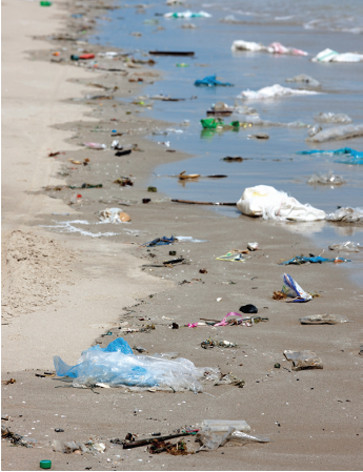 The European Union is paying fishermen to trawl for trash, to clean up littered beaches like this one. (Photo
by Enviromantic/iStockphoto)
The European Union is paying fishermen to trawl for trash, to clean up littered beaches like this one. (Photo
by Enviromantic/iStockphoto)
Visitors lingering over an alfresco meal in the French Riviera fishing village of Saint-Jean-Cap-Ferrat might be surprised to discover that the catch of the day is plastic trash. Since May, this scenic harbor has been the pilot site for a European Union Fisheries Commission project designed to protect declining fish stock in the Mediterranean Sea while also removing tons of plastic debris from the sea.
The French government, supported by the European Union Fisheries Fund, pays for the fishermen’s time. Europe’s plastics industry provides special debris-collecting trawl nets (which cost from $23,000 to $57,000 apiece), and also picks up the tab for recycling and other costs.
Maria Damanaki, European commissioner for maritime affairs and fisheries, says the novel effort is one of several action steps needed to reduce pollution and restore fish stocks in the Mediterranean. The sea has become “an open wound for biodiversity, ecosystems, and our civilization,” she warns. “The situation of marine litter and especially plastic litter has taken threatening dimensions.”
When fishermen are trawling for plastic debris, they aren’t depleting already dwindling fish stocks. Nor are they throwing back dead fish that bring low prices at market, a practice known as “discarding” that’s common in these waters.
Using government subsidies to provide fishermen with an alternate income makes good economic sense, according to Rashid Sumaila, economist and director of the Fisheries Centre at the University of British Columbia. By his analysis, nearly 30 percent of the global fishing industry’s $80 billion annual revenue comes from government subsidies. “Subsidies lead to overfishing. This (fishing for trash) approach leaves money in the fishing community and uses subsidies to do good work,” he says. Potential benefits are threefold. “It helps the fish, cleans the oceans, and provides livelihood for fishers,” Sumaila says. “It’s a beautiful solution, if implemented well.”
Fishing for trash may be a novel solution, but it represents a mere drop in the ocean compared to the size of the problem. Once plastic bags reach the sea, they start to break down into tiny pieces of aquatic trash. These bits can get into the food chain, creating potential health risks for a variety of species, including humans. Researchers estimate that there are 250 billion plastic pieces submerged in the Mediterranean, according to Damanaki, and another 500 tons of plastic floating on the surface of the sea. Some 80 percent of ocean pollution originates on land, Sumaila adds.
Because the Mediterranean is a closed sea, it’s especially vulnerable to pollution. Cleanup efforts will require a variety of measures. Italy recently banned plastic bags, and other efforts to reduce pollution at the source are under way. Meanwhile, Damanaki remains hopeful that the “visible result” of French fishermen hauling out tons of plastic will encourage other coastal communities to get in on the act.
Her willingness to pilot new ideas is drawing praise from ocean researchers. “She’s doing wonders,” says Sumaila, who cautions that there’s much more work to be done. “But this is a good beginning.”
If trawling for trash proves to be workable in the Mediterranean—which represents just 1 percent of the planet’s ocean surface—the idea could set off a wave of similar activity around the globe.
Support SSIR’s coverage of cross-sector solutions to global challenges.
Help us further the reach of innovative ideas. Donate today.
Read more stories by Suzie Boss.

